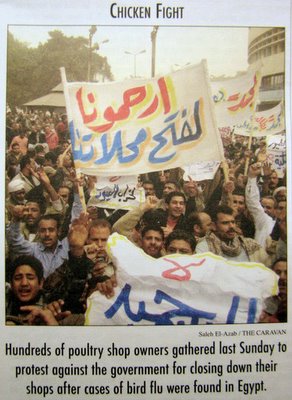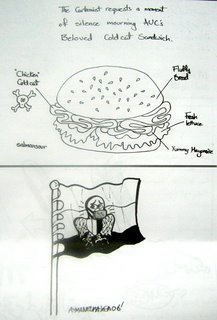Dejehj, Dejehj, Dejehj
 Well I found out what that protest last week was all about--chickens. According to the AUC newsletter, The Caravan, and my observations of Cairo in the last few days, poultry will soon be nearly impossible to find in any form in the premises of the city.
Well I found out what that protest last week was all about--chickens. According to the AUC newsletter, The Caravan, and my observations of Cairo in the last few days, poultry will soon be nearly impossible to find in any form in the premises of the city.We went on a stroll with Dr. Ikram in the Theories and Methods of Archaeology class last week in order to learn how to observe the taphonomy of cultural detritus. We poked at "unofficial middens," thought up a variety of causes for differences in the color of tile on the sidewalk, and generally drew a crowd wherever we went because nobody could imagine why a bunch of students would be staring at a mere pile of garbage.
Another thing we noticed on our little jaunt besides what styles of plasticware people around here use and how many flavors of Chipsy packets there are was the massive numbers of shops that had once sold poultry, but now stood empty--their stacks of poultry cages and mounds of sawdust unused, their neon chicken-shaped signs unlit, and nothing more than a small crate of sorry-looking ice-packed fish out front as the shopkeepers' only present means of livelihood.

While I suppose I should be glad that the Egyptian government has so quickly and effectively put a stop to any potential human infection with the Avian Flu virus, by getting rid of nearly if not all poultry in the city, it seems very unfortunate that so many local people have to suffer by this policy.
And just as a note for those of you who, like Ryan, were not certain of the magnitude of the problems Avian Flu presents for the local population, and the size of the effect of the new poultry ban will have on the local economy, the vast majority of the meat available in Cairo is slaughtered on the spot or only an hour or two before sale. There are many butcher shops and poultry shops all over the city, several within less than a block of AUC's Greek Campus.
 Nearly everyone passes within breathing range of still-living meat fowl every day, and the numbers of local poultry salesmen and butchers are vast.
Nearly everyone passes within breathing range of still-living meat fowl every day, and the numbers of local poultry salesmen and butchers are vast.It also presents an additional problem for me--and my non-eating of red meat. Due to Islamic law, pork is generally not available here, and now poultry is not either. Lamb tends to be a bit expensive, so beef is all that is left. Maybe it'll actually be good for me, and I'll have a reason to make myself go veggie, though it's much harder to eat here healthily here as a non-veg much less as a vegetarian.
Besides, what will I do without my chicken fahita sandwich every day? One can only eat so much foul or tameyya. I'm probably going to end up so anemic that I'll just keel over some day soon.
Enjoy the cartoons. They're also from The Caravan. For reference about the 2nd cartoon, the original Egyptian flag looks like this.

3 Comments:
I can imagine the dire straits of poultry vendors. The impact of a poultry ban in the U.S. -- I think it's only a matter of time -- is going to be disastrous for the likes of Pollo Loco, KFC, Chick-Fil-A, Charo Chicken, etc.
Though chicken in Egypt is fast becoming a fond memory, I'd still like to ask: did fresh chicken taste different from the kind we get in U.S. grocery stores, transhipped over days and long distances? Or maybe it was hard to tell after AUC's comissary got done with it.
-Ken
9:24 PM
The chicken "fahita" I've had here tasted essentially the same as the stuff back in the states, though it's true AUC's commissary was the main fahita enabler.
Since I don't eat the kofta, all the other meat I've had here (chicken or otherwise) is usually so fried/cooked with sauce that the subtleties of flavor are a lot harder to pick out.
Tameyya (falafel) here is pretty good. It's green though, which is a little disconcerting at first.
3:51 AM
PASS THIS ON''''''''
HAPPY BIRTHDAY KIT CHEW
WITH LOVE
GRANDMA AND GRANDPA
7:32 PM
Post a Comment
<< Home